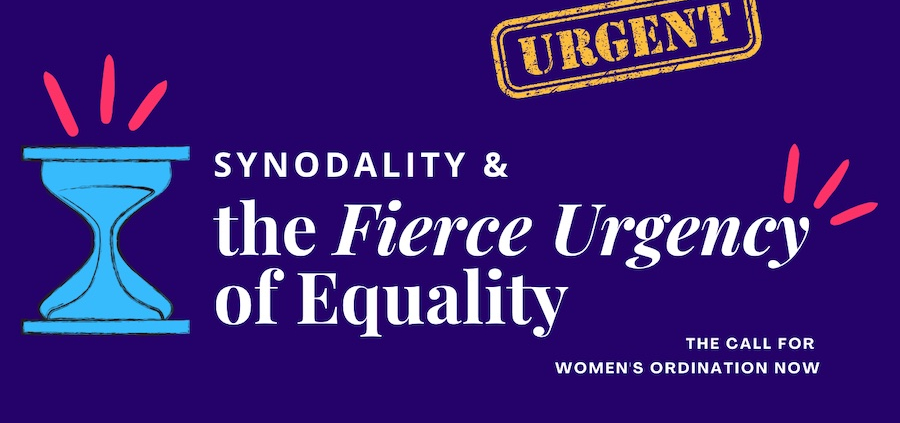Pushing from the Margins by Sarita Melkon Maldjian
As we reflect on the year that has passed and prepare to celebrate Thanksgiving, one of the most beloved American holidays, with family and friends, it seems appropriate for all involved in the Synod of Synodality, Spirit Unbounded, and the 48th annual Women’s Ordination Conference (WOC) gathering, “Synodality and the Fierce Urgency of Equality,” to bow our heads at Mass truly feeling the words, “Let us give thanks to the Lord our God.” These words bring us peace, joy, and the universal love of our God almighty, our maker of heaven and earth.
We have been blessed to voice our thoughts and prayers in comfort and safety while so many others are suffering in war zones around the world. The 42-page Synod synthesis report, an interim document summarizing the results of the conversations that took place during the Synodal Assembly’s small group and plenary sessions, states: “The Assembly hears the cry of the ‘new poor,’ produced by wars and terrorism that plague many countries on several continents, and the Assembly condemns the corrupt political and economic systems that cause such strife.” For those afflicted by war, nothing is “truly right and just.” On a much lesser scale, neither is the verdict within the same report that postpones the ordination of women to the diaconate until next year’s Synod.
The Synod will meet again in Rome in October 2024 to unearth this decades-old debate that remains unresolved, as the battle of women’s ordination has not been lost or won. With regard to women’s access to the diaconate, the synthesis report states:
For some, this step would be unacceptable because they consider it a discontinuity with Tradition. For others, however, opening access for women to the diaconate would restore the practice of the Early Church. Others still, discern it as an appropriate and necessary response to the signs of the times, faithful to the Tradition, and one that would find an echo in the hearts of many who seek new energy and vitality in the Church.
The bestowal of the diaconate on women is not a novel phenomenon in the church as stated above. Over several centuries, this office developed steadily, in clear stages. Its focus in lively contemporary debates and at the Synod sheds light on an expired position that women once held but desperately needs to be resuscitated. The acknowledgement that women were deacons in the early church is the olive branch that we must accept and work with this next year leading up to the October 2024 Synod.
Bernadette Raspante, who was with WOC in Rome for the events surrounding the Synod and Spirit Unbounded, and who marched there with others for the cause of women’s ordination, writes at the WOC’s blog, The Table:
The experience reaffirmed my vocation to continue to fight for the ordination of women in the Catholic Church. . . . [W]e are not thrilled with the Synod Synthesis Report, but we did all we could to make sure that our voices were heard. Walking with others called to priestly vocations and their strong supporters, praying with the Vatican at our backs, asking big theological questions about sacraments and blessings . . . the fight is not over, but I do think we moved the needle. And being in community and solidarity with others as these conversations were happening at the Vatican was energizing—for individuals, but also for the movement.
To state that the lack of a conclusion for the ordination of women during this most highly anticipated Synod—after 48 years of deliberation and striving—is unfair is an understatement. As I teach my students in my university classes, it takes those of privilege to use what power they possess to help raise the voices of others. This is what women of any means of any kind whatsoever need to do. We need to use our education and resources to continue the example of the original suffragists who assembled at the first WOC gathering on Thanksgiving weekend in 1975. We need to keep pushing from the margins of the church to make a change.
As female supporters of the Catholic Church, we must also pray for the patriarchal hierarchy to soften their hardened hearts and lower the thick wall of restrictions from the altar. As Kate McElwee, the executive director of WOC, stated in her presentation for Spirit Unbounded, “The voices of women with sincerely discerned calls to priesthood remain some of the most marginalized voices in the Catholic Church. If the church is truly listening, they will walk with these women throughout the Synodal process.” She also stated: “Women long for their voices to be heard in the church, and part of our work is to create spaces for women’s voices to be heard and champion their wisdom as the church continues on this journey.”
On the issue of women having the option to leave the Catholic Church to fulfill their desire to be ordained, McElwee referenced the findings of the WOC’s synodal listening sessions, stating, “Catholic women and people of marginalized genders persist. Despite their heartbreak and doubt, they are able to cultivate and find joy in their Catholic identity and faith.” We cannot jump ship and leave our mother church, for we not only will lose our identity but lose what we have been working towards for so long. Change happens when we “stay the course.”
This past weekend, WOC’s global virtual conference shed light on the interrelated issues that have prevented the advancement of women’s ordination, including sexism, colonialism, capitalism, and racism, to name a few. Speakers included Lizzie Berne DeGear, Jamie Manson, Dr. Emily Reimer-Barry, Shannon Evans, Ruby Almeida, Anne Soupa, Flora X. Tang, Dr. Valerie Lewis-Mosley, and more.

An auction item at the WOC gathering
The event began with optimism on Friday night, and a feeling of hope continued throughout the weekend, culminating in the final Sunday morning Mass online. There was also an online auction which, appropriately enough, included Womanpriest Barbies.
Speakers and participants came from all over the world, each giving a new voice and perspective to the results of the Synod. One of the many outstanding speakers was Oxford graduate Dr. Father Luigi Gioia, who gave a concise explanation behind why the church refuses to ordain women. He closed his presentation by stating plainly, “Let me say it clearly: There is no valid theological argument that justifies the refusal of the ordination of women in the Catholic Church. There is just a flawed pseudo-theological narrative which has permeated Catholic spirituality, and which is the main culprit of what Pope Francis calls the scourge of clericalism.”
The closing Mass was conducted by women and was very inspirational. After the sermon, during the prayers before the Eucharist, one of the speakers stated, “When we are joyful, may we be unafraid to dance.” I was elated to hear such a prayer, because this type of courage is greatly needed when women feel damaged and voiceless. As the Mass closed with about 100 participants, the message of urgency spread throughout our hearts with peace, hope, and joy for a new year of sharing, speaking, and listening to those in our communities and across the nations of women looking for resolutions.
As we bow our heads in prayer this Thanksgiving, let the words of E. M. Forster’s Howards End come to mind: “I am sure that if the mothers of various nations could meet, there would be no more war.” Only then can we pray for our words to rise to the ears of those voting in the next Synod to see the “mothers” of the church as apostles and ordained leaders. ♦
Sarita Melkon Maldjian is a professor of the Core and the English departments at Seton Hall University in South Orange, New Jersey. She is an advocate for Catholic school education and ordaining women in the Catholic, Orthodox, and Apostolic churches. She and her family are active members in the Armenian Apostolic Church, and all of her children have attended Catholic schools from pre-K through grade 12. She and her family are professional classical musicians and have performed all over the tri-state area. She holds her master’s degree in theology and doctorate degree in Biblical studies and music pedagogy from Drew University, Madison, New Jersey.





Leave a Reply
Want to join the discussion?Feel free to contribute!